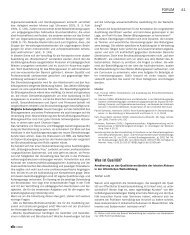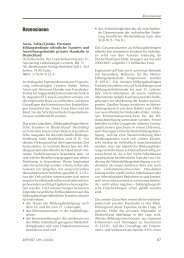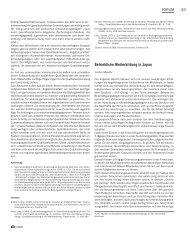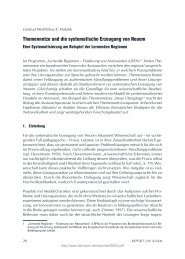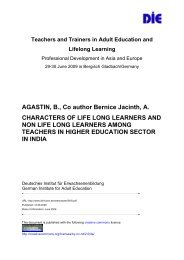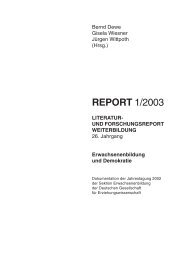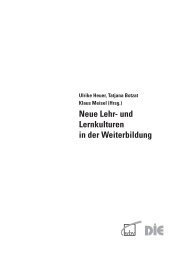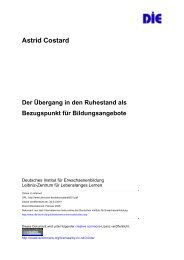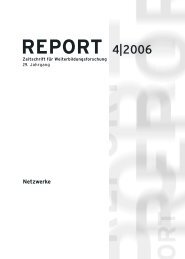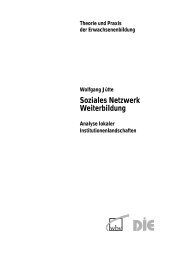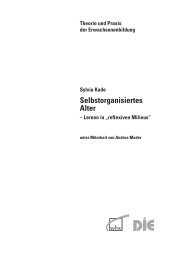Accreditation of Prior Experiential Learning (APEL)
Accreditation of Prior Experiential Learning (APEL)
Accreditation of Prior Experiential Learning (APEL)
Create successful ePaper yourself
Turn your PDF publications into a flip-book with our unique Google optimized e-Paper software.
y the extent to which <strong>APEL</strong> is credible within the institutions and also by the reality<br />
that different institutions see <strong>APEL</strong> merely as a means <strong>of</strong> opening doors to students who<br />
‘missed out’ on previous educational opportunity, or more radically, as a means <strong>of</strong><br />
providing potential students with formal recognition <strong>of</strong> previous achievements which<br />
carries with it the possibility <strong>of</strong> exemption from parts <strong>of</strong> an academic programme or<br />
even academic credit” (Merrill/Hill 1999, p 531).<br />
There are signs that universities are changing – the emergence <strong>of</strong> the information<br />
society and globalisation have produced the move towards mass universities and<br />
certainly in the UK universities are characterised by a heterogeneous student population.<br />
Change, however, has not been wholesale across all universities and European<br />
countries. Traditional universities have the power and autonomy to resist change and<br />
maintain elite institutions for reproducing the next generation <strong>of</strong> intellectual elites.<br />
What may happen in the future is the development <strong>of</strong> a pluralistic system with different<br />
types <strong>of</strong> universities having different functions. In the UK, for example, the future<br />
university system may become diversified between the old universities (universities in<br />
the binary era) concentrating and research and the new universities (post binary<br />
institutions) focusing on teaching. Universities have recently been asked by the Government<br />
to find ways <strong>of</strong> enhancing the differences between institutions. Currently it is<br />
the new universities that have embraced the idea and practice <strong>of</strong> <strong>APEL</strong> more than the<br />
old universities.<br />
References<br />
Antikainen, A./Houtsonen, J./Kauppila, J. et al. (1999): Living in a learning Society. London<br />
Assiter, A./Shaw, E. (1993): Using Records <strong>of</strong> Achievement in Higher Education. London<br />
Bailey, S./O’Hagan, C. (1999): Accrediting <strong>Prior</strong> <strong>Experiential</strong> learning in Higher Education: Bridging<br />
the gap between formal and informal learning. In: Alheit, P./Piening, D. (eds.) (1999):<br />
Assessment <strong>of</strong> prior experiential learning as a key to lifelong learning. Bremen<br />
Barkatoolah, A. (1998): The French Experience <strong>of</strong> APL in Higher Education. In: Bailie, S./<br />
O’Hagan, C. (eds.) (1998): Strategic Models <strong>of</strong> Lifelong <strong>Learning</strong>: The Method <strong>of</strong> <strong>APEL</strong>, pp<br />
12-19<br />
Bourgeois, E./Duke, C./Guyot, J. L. et al. (1999): The Adult University. Buckingham<br />
Brookfield, S. (1983): Adult Learners. Adult Education and the Community. Milton Keynes<br />
Butterworth, C. (1992): More than on bite at the <strong>APEL</strong>. In: Journal <strong>of</strong> Further and Higher Education,<br />
No. 3, pp 39-51<br />
Challis, M. (1993): Introducing <strong>APEL</strong>. London<br />
Cleary, P./Whittaker, R./Gallacher, J. et al. (2002): Social Inclusion through <strong>APEL</strong>: a Learners’<br />
Perspective. Comparative Report. European Commission: Socrates-Grindtvig Project<br />
Delanty, G. (2001): Challenging Knowledge. The University in the Knowledge Society. Buckingham<br />
Evans, N. (1990): Pragmatism at work in Britain: Some reflections on attempting to introduce<br />
the assessment <strong>of</strong> prior experiential learning. In: Studies in Continuing Education, No. 2, pp<br />
122-130<br />
68


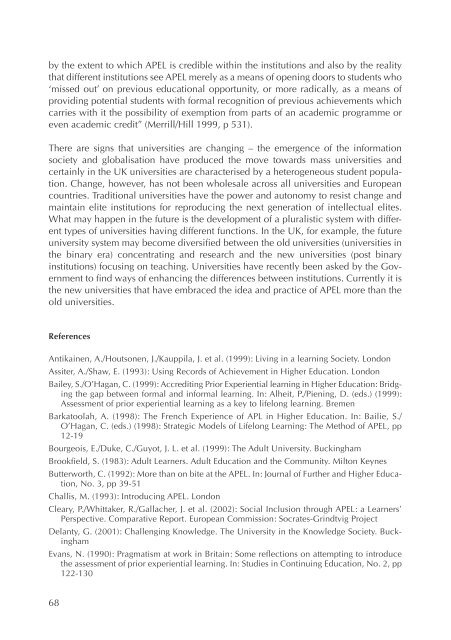
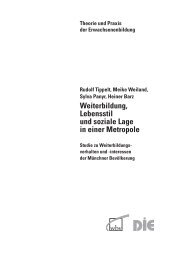
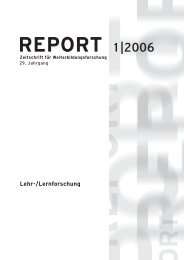
![PDF [KB 892] - Deutsches Institut für Erwachsenenbildung](https://img.yumpu.com/7495168/1/144x260/pdf-kb-892-deutsches-institut-fur-erwachsenenbildung.jpg?quality=85)
